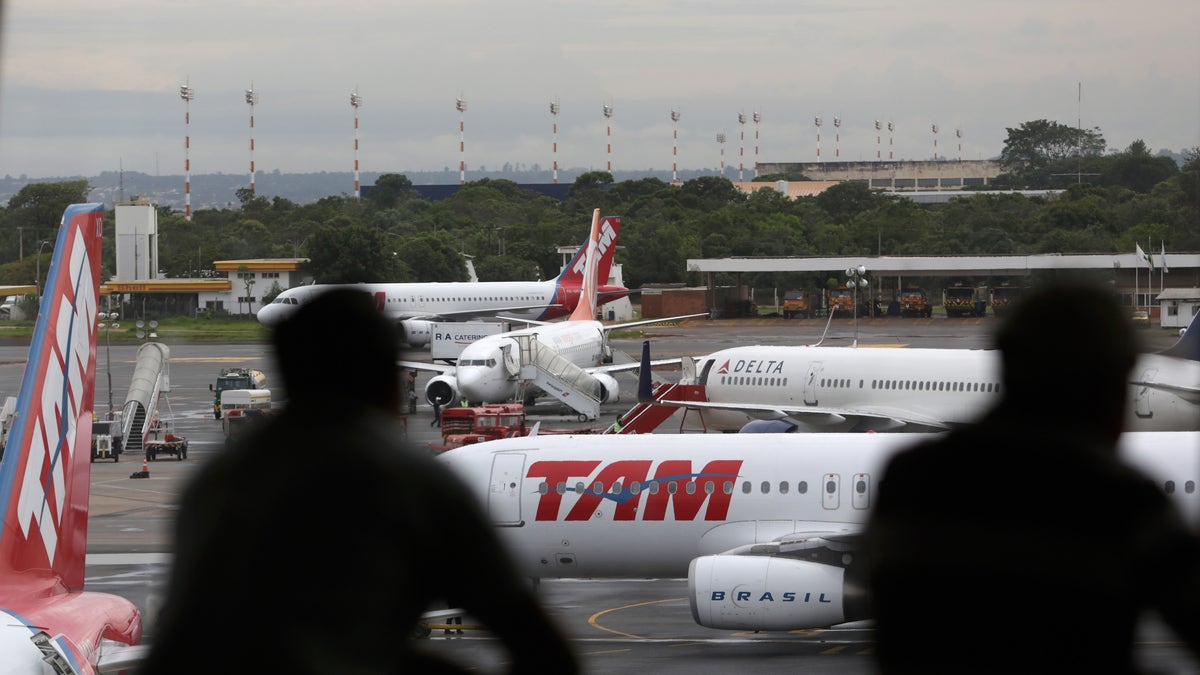
FILE - In this Nov. 28, 2013 file photo, people look at jetliners at the Brasilia international airport, in Brasilia, Brazil. As Brazil's airline industry has come under pressure from the national government to control fares, Avianca Brasil has joined Azul in becoming the second Brazilian airline to promise to cap prices for the upcoming football World Cup, which opens in June. (AP Photo/Eraldo Peres, File) (The Associated Press)
RIO DE JANEIRO – Avianca Brasil has joined Azul in becoming the second Brazilian airline to promise to cap prices for the upcoming football World Cup, which opens June 12 in Sao Paulo.
Avianca said Tuesday it would match Azul and limit one-way fares to a maximum of 999 reals ($425).
Brazil's airline industry has come under pressure to control fares from the national government, which has threatened to intervene if price increases are seen as gouging customers.
The government has made similar threats against hotels, some of which have increased prices as much as five times.
Brazil's tourist agency Embratur has estimated between 500,000 and 600,000 foreign fans will visit Brazil with more than 3 million local tourists traveling to matches in 12 cities across the continent-size country.
"I think this promotion is going to attract more passengers," Avianca's chief executive officer, Jose Efromovich, said in Sao Paulo.
Despite the cap on prices, fans could still face long trips going through many airports that are old and outdated. Brazil is slightly larger than the continental United States, but smaller when Alaska and Hawaii are counted.
Later this week authorities are expected to authorize new domestic flights. Four Brazilian airlines have requests with the government to add 1,523 extra flights during the World Cup period. However, the added routes could put more pressure on the already crowded airports and related infrastructure.
Both airlines said capping fares would result in losses, and they noted the World Cup was unprofitable since it drove away regular business travelers.
Air will be the only mode of travel for most foreigners. Brazil has limited rail service and the road network is underdeveloped and crowded.
A study published in October by the Sao Paulo newspaper Folha de S.Paulo said airfares during the World Cup were up to 10 times more expensive than normal.
Air travel is only part of a list of problems surrounding the World Cup, which opens June 12 in Sao Paulo and ends July 13 in Rio.
Only six of the 12 World Cup stadiums are ready, and three of the six may not be delivered until April.
Brazil is spending about $3.6 billion on new stadiums or refurbishing old ones, and the price keeps increasing with cost overruns and worker overtime.
FIFA President Sepp Blatter acknowledged to the Swiss newspaper 24 Heures that Brazil is "the country that is the furthest behind" in World Cup preparations in his four decades of experience.
Police are also preparing for protests, some of which may center on the billions being spent in a country with rampant social inequality and poor schools and hospitals.
___
Associated Press writer Marco Sibaja in Brasilia contributed to this report.
___
Stephen Wade on Twitter: http://twitter.com/StephenWadeAP
